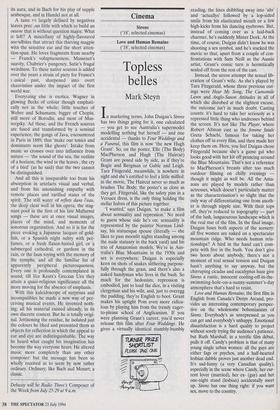Cinema
Sirens ('18', selected cinemas)
Topless belles
Mark Steyn
In marketing terms, John Duigan's Sirens has two things going for it, one calculated — you get to see Australia's supermodel modelling nothing but herself — and one accidental — thanks to Four Weddings and a Funeral, this film is now 'the new Hugh Grant'. So, on the poster, Elle (The Body) MacPherson and Hugh (The Haircut) Grant are posed side by side, as if they're Bogie and Bergman or Gable and Leigh. Tara Fitzgerald, meanwhile, is nowhere in sight and she's entitled to feel a little miffed: in the movie, The Haircut never so much as brushes The Body; the poster's as close as they get. Fitzgerald, like the safety pins in a Versace dress, is the only thing holding the stellar halves of this picture together.
'I wanted,' says Duigan, 'to make a film about sensuality and repression.' No need to guess whose side he's on: sensuality is represented by the painter Norman Lind- say, his statuesque spouse (literally — she likes to pass moonlit nights standing among the nude statuary in the back yard) and his trio of Amazonian models. We're in Aus- tralia's Blue Mountains in the 1930s and sex is everywhere: Duigan is especially keen on shots of snakes slithering purpose- fully through the grass, and there's also a naked handyman who lives in the bush. So much for the hedonists; repression is embodied, just to load the dice, in a visiting clergyman and his wife, and, just to overegg the pudding, they're English to boot. Grant makes his uptight Pom even more ridicu- lous by playing him from the trendy eager- to-please school of Anglicanism. If you were planning Grant's career, you'd never release this film after Four Weddings. He gives a virtually identical stumbly-bumbly reading, the lines dribbling away into `ahs' and `actuallys' followed by a lop-sided smile from his elasticated mouth or a few high-kicks from his dancing eyebrows. But, instead of coming over as a laid-back charmer, he's suddenly Mister Dork. At the time, of course, Duigan didn't know he was shooting a sex symbol, and he's stacked the movie so that, apart from a couple of con- frontations with Sam Neill as the Aussie artist, Grant's comic turn is hermitically sealed off from the rest of the cast.
Instead, the sirens attempt the sexual lib- eration of Grant's wife. As she's played by Tara Fitzgerald, whose three previous out- ings were Hear My Song, The Camomile Lawn and Anglo-Saxon Attitudes in all of which she disrobed at the slightest excuse, the outcome isn't in much doubt. Casting counts: it's hard to take her seriously as a repressed little thing who undresses behind the screen. It's not like The Player, where Robert Altman cast as the femme fatale Greta Schachi, famous for taking her clothes off in every film, and then made her keep them on. Here, you feel Duigan chose Fitzgerald because she's a game gal who looks good with her kit off prancing around the Blue Mountains. That's not a reference to MacPherson's breasts after too much outdoor filming on chilly evenings — though it might as well be. All the Ama- zons are played by models rather than actresses, which doesn't particularly matter as the characterisation's so slight that the only way of differentiating one from anoth- er is through nipple size. With their tops off, they're reduced to topography — part of the lush, languourous landscape which is the real star of the film. In the final image, Duigan fuses both aspects of the scenery: all five women are naked on a spectacular mountain ridge. Who needs human rela- tionships? A bird in the hand can't com- pete with five in the bush. You don't give two hoots about anybody, there's not a moment of real sexual tension and Duigan hasn't anything to say anyway, but the chirruping cicadas and eucalyptus haze give Sirens a rustic, innocent cooling-off-in-the- swimming-hole-on-a-sunny-summer's-day atmosphere that's hard to resist.
Love and Human Remains, the first film in English from Canada's Denys Arcand, pro- vides an interesting contemporary perspec- tive on the wholesome bohemianism of Sirens. Everybody's as unrepressed as you can get and everybody's unhappy. Emotional dissatisfaction is a hard quality to project without sorely trying the audience's patience, but Ruth Marshall, in a terrific film debut, pulls it off. Candy's problem is that of many young single urban women: all the guys are either fags or psychos, and a half-hearted lesbian dabble proves just another dead end. It's sad-funny (a very Canadian quality), especially in the scene where Candy, her cur- rent lover (married), her ex- (gay) and her one-night stand (lesbian) accidentally meet up. Sirens has one thing right: if you want sex, move to the country.


















































 Previous page
Previous page